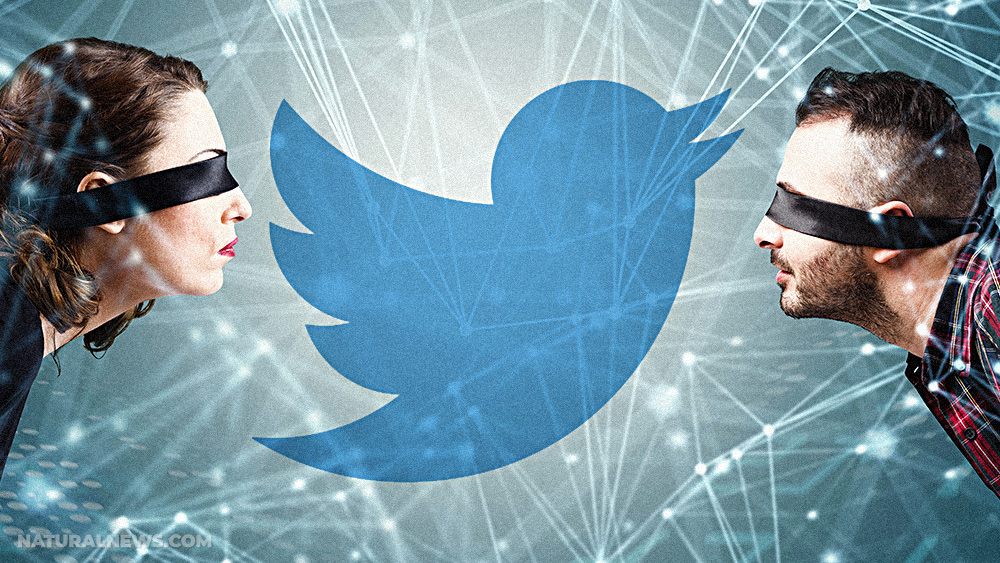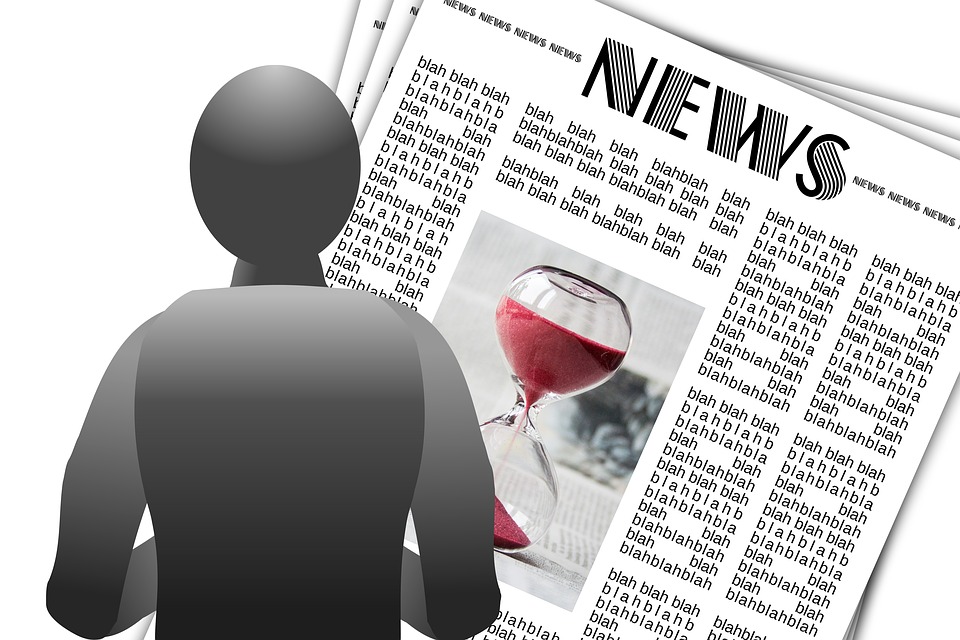Did Twitter fact-check Trump – or conformity-check him?
06/09/2020 / By News Editors

News flash for Twitter: When you start writing editor’s notes, you are an editor.
(Article by Frank Miele republished from RealClearPolitics.com)
That, in essence, is how Twitter unmasked itself on Friday by dropping an “editor’s note” on a tweet by President Trump about the rioting in Minneapolis. The president chastised “the THUGS” for “dishonoring the memory of George Floyd,” the man who died in police custody, by engaging in lawless behavior. Trump said he had told Minnesota Gov. Tim Walz that “the Military is with him all the way” in his efforts to restore order.
“Any difficulty and we will assume control but, when the looting starts, the shooting starts,” the president added. That presumably is what provoked some troll at Twitter to slap a warning on Trump’s tweet, saying that it violated a company rule against “glorifying violence.”
Excuse me? Exercising legitimate police power in response to unlawful violence is now considered “glorifying violence”? In what dystopian Marxist opium dream are we now living? Were the proud patriotic rallies held after the death of fugitive terrorist Osama bin Laden also considered “glorifying violence”? Is rooting for law and order considered a microaggression against looters?
Twitter has for years pretended to be a neutral internet platform that offered “a true diversity of political discourse” and therefore was exempt under the misnamed Communications Decency Act from being held liable for any offensive content posted on its site. But that went out the window last week.
In the course of an astounding 100 hours, Twitter effectively shed its liability exemption by revealing exactly what it truly is — a publisher with a political agenda — and therefore subject to the same laws that obligate all publishers to take responsibility for any content they publish.
The Trump-Twitter War started on Tuesday when the president tweeted that California’s plan to rely exclusively on mail-in ballots would be “substantially fraudulent” and result in a “rigged election.” You would think that the president, as the leader of a country based on free speech, could say that on a “neutral platform,” but you would be wrong.
Twitter didn’t like what the president wrote, so the company created a new policy that allowed it to flag his tweets as “unsubstantiated, according to CNN, Washington Post and others.” [Emphasis added.] Never mind that hundreds of other sources could be provided to buttress the president’s concerns; CNN has spoken!
That warning (replete with its own bright blue exclamation point!) looked suspiciously like an editor’s note also, and it certainly was intended to call into question the legitimacy of Trump’s tweet. Moreover, the fact that Twitter chose to initiate this new policy because it was offended by the political speech of the president was suspicious at best.
I’m no lawyer, but common sense tells me that as soon as Twitter evaluates a tweet for content, it has stepped beyond its role as a neutral platform and has become a publisher. If so, then the president was entirely correct in his Thursday executive order calling for a review of the legal protections that have been granted to internet companies like Twitter and Facebook for decades.
As the editor of a small daily newspaper in Montana from 2000 to 2018, I had to navigate the tricky legal waters of liability regarding both a print and online publication.
With print, the rules were simple: Don’t publish anything in your paper that is potentially libelous because no matter who wrote it or said it, you and your newspaper are responsible for it.
With the new field of internet publishing, it was not so cut and dried. Thanks to Congress carving out exemptions for online tech companies like Facebook and Twitter to avoid liability, there was suddenly a distinction between being a platform and a publisher. Social media companies argued that they didn’t control the content published by individuals, but rather just offered a platform for those individuals. In other words, they put up the soap box but didn’t control who could stand on it and shout their piece.
That left newspapers with a choice. Do we moderate online comments and edit them the same way we would edit letters to the editor to eliminate libelous statements, or do we just let them run as submitted no matter what they say?
Legal experts advised newspapers to do one of two things — run no comments or run all comments. Don’t pick and choose, or you could be mistaken for a publisher, which would leave you liable for any tort committed by the commenter. So much better to be a platform and wash your hands of any responsibility for the vile and stupid things people often write. And if you were alerted by online readers that something offensive had been written in a comment, just delete it (as the Communications Decency Act allows), but never ever edit it, lest you be mistaken for a publisher, and thus acquire liability.
At my newspaper, we followed that rule assiduously, and so did most other internet platforms and websites, but as soon as Twitter inserted itself as a filter between the president and the people of the United States, it dropped the veil of neutrality and exposed its naked political agenda. Bang! Just two days later, with Attorney General Bill Barr standing beside him, President Trump issued his Executive Order on Preventing Online Censorship.
The reactions have been predictable. Just like Twitter’s original “fact check,” the facts didn’t seem to matter. Trump antagonist Andrew Napolitano claimed erroneously that Twitter and Facebook do not have to be neutral public platforms in order to invoke the protections offered by the Communications Decency Act. He argued fancifully that the Citizens United opinion by the Supreme Court gives corporations the right of free speech, and therefore they can’t be forced to live up to the requirements of the CDA.
“The comments by the attorney general are totally out of line. The government cannot censor speech, it cannot interfere with free speech, it can’t threaten free speech, and it can’t chill free speech,” the former New Jersey state judge argued.
This is an absurd argument because the whole premise of the “neutral platform” provision is that it’s not Twitter that is engaging in speech, but rather individuals who could be standing on a soap box anywhere. The question is not whether the government is interfering with Twitter’s free speech, but whether Twitter is interfering with its own community’s free speech. If it is, then it is using editorial judgment and is no longer eligible for the protections of the Communications Decency Act.
When for the very first time Twitter decided to “fact-check” a tweet — after having facilitated millions of inaccurate ones every day — the company targeted one by President Trump, making clear that the new policy was being used in the service of a political agenda. Moreover, when the faceless fact-checkers relied on liberal reporting by the slanted Washington Post and propagandistic CNN to warn voters not to trust Trump, they gave away the game. The Post and CNN disagree with Trump about everything. It sets the bar impossibly high for the president if his political opinions have to be cleared by those twin pillars of hypocrisy. Nor, it should again be noted, did Twitter look for reports that did substantiate the president’s claim that mail-in voting is rife with fraud. There are such reports, but of course any news source that agrees with Trump would itself be considered unworthy of being used for a fact check, right?
Mark Zuckerberg, the founder of Facebook, knows just what a dangerous position Jack Dorsey of Twitter has put himself and the rest of the internet infosphere in.
“I just believe strongly that Facebook shouldn’t be the arbiter of truth of everything that people say online,” Zuckerberg told Fox News’s Dana Perino. “I think in general, private companies probably shouldn’t be — or especially these platform companies — shouldn’t be in the position of doing that.”
Of course not. It would be a nearly impossible task to monitor every comment posted online, and yet by discarding the illusion of neutrality, that is exactly what Twitter has invited. Think of the thousands, or more likely hundreds of thousands, of new employees Facebook and Twitter would have to hire to monitor and delete posts that are potentially libelous if platforms lose their protection as neutral platforms. Is it even humanly possible to moderate those posts in real time? Is it even robotically possible?
Zuckerberg is rightly terrified of the Pandora’s box that Jack Dorsey has opened — and we should all be terrified if Dorsey wins his battle to censor the president.
It is beyond obvious that if this first shot across the bow of neutrality were allowed to stand, then Dorsey and his far-left colleagues on the USS Twitter would be emboldened to go after Trump and other conservatives on a whole host of issues. Immigration? Health care? Limited government? Just what issue would CNN agree with Trump about?
What we are talking about is not a fact check, but a conformity check, and it must not go unanswered.
Trump’s challenge to the unbridled power of Twitter, Facebook and Google is in fact long overdue. Just ask actor James Woods, who was banished from Twitter for months because he refused to delete a tweet that quoted Ralph Waldo Emerson, the greatest American philosopher and the author of “Self-Reliance.”
Here’s a tidbit from that brilliant essay that speaks aptly of the value of being forced to conform to the tomfoolery of know-it-alls and self-appointed guardians of the truth like Twitter:
“Conformity makes [most men] not false in a few particulars, authors of a few lies, but false in all particulars. Their every truth is not quite true. Their two is not the real two, their four not the real four; so that every word they say chagrins us, and we know not where to begin to set them right.”
I have often felt that way, unable to confront the monstrous distortion of reality that political correctness would impose upon us all — not knowing where to begin to set it right — but President Trump in four short days in May settled the matter once and for all.
“Free speech is the bedrock of American democracy,” his order declared. “The freedom to express and debate ideas is the foundation for all of our rights as a free people. … [W]e cannot allow a limited number of online platforms to hand pick the speech that Americans may access and convey on the internet.”
If we do, then we don’t deserve the blessings of liberty that our forebears bequeathed to us.
Read more at: RealClearPolitics.com
Tagged Under: bias, Censorship, civil unrest, conformity check, Fact Check, politics, protests, riots, Trump, Twitter
New title
COPYRIGHT © 2017 FACTCHECK.NEWS
All content posted on this site is protected under Free Speech. FactCheck.news is not responsible for content written by contributing authors. The information on this site is provided for educational and entertainment purposes only. It is not intended as a substitute for professional advice of any kind. FactCheck.news assumes no responsibility for the use or misuse of this material. All trademarks, registered trademarks and service marks mentioned on this site are the property of their respective owners.



